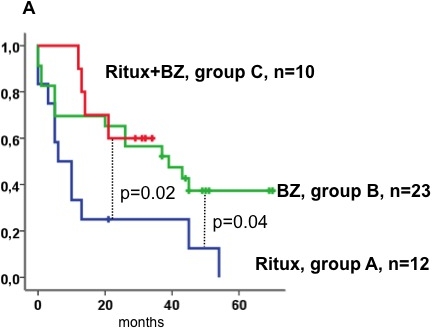Retrospective Cohort Study Concerning Efficacy and Safety of Bortezomib in Combination With Or Without Rituximab in Antibody Mediated Rejection in Renal Transplant Recipients
Charité
Universitätsmedizin Berlin, Department of Nephrology, Berlin, Germany.
Meeting: 2015 American Transplant Congress
Abstract number: A108
Keywords: CD20, Graft survival, HLA antibodies
Session Information
Session Name: Poster Session A: Kidney Antibody Mediated Rejection
Session Type: Poster Session
Date: Saturday, May 2, 2015
Session Time: 5:30pm-7:30pm
 Presentation Time: 5:30pm-7:30pm
Presentation Time: 5:30pm-7:30pm
Location: Exhibit Hall E
Treatment of antibody-mediated rejection (AMR) in renal transplant (tx) patients (pts) is still challenging and long-term outcome remains unsatisfying. Because plasma cells (PCs) are crucial for donor specific HLA antibody (DSA) formation, targeting this cell population with bortezomib (BZ) is quite reasonable. Combination of BZ with the B-cell depleting rituximab (Ritux) may display synergistic effects on precursor and mature DSA producing cells.
The aim of this study was to evaluate the efficacy and safety of three different AMR therapy regimens with Ritux (n=12, group A), BZ (n=23, group B) or Ritux+BZ (n=10, group C).
45 tx pts (men:29) with graft dysfunction, DSA and biopsy proven AMR according to BANFF classification were included into the study, starting in 1/2005. All pts received steroid pulse and PPH (6x). In addition, group A received a fixed dose of Ritux 500mg and IVIG 30g. Group B received 1 cycle of BZ (1.3 mg/m2; day 1, 4, 8, 11) and IVIG (30g; n=11 or 1.5g/kg; n=12). Group C received a combination of Ritux 500mg and one cycle of BZ with high dose IVIG. Pts had a mean follow-up of 59 (SD+/-22.5) months (m).
Cumulative pt survival was 94.3% in the follow-up. One pt died due to unknown cause 23m after treatment (group A) and one pt died from MI 33m after AMR therapy (group B). In general, graft survival was inferior in group A (1/12; 8.3%) as compared to group B (9/23; 39.1%; p=0.04) and group C (6/10; 60%; p=0.02) at the end of follow-up time. However, between group B and C, no significant difference was seen concerning graft survival.  Notably, in group C adverse events, in particular infections were more dominant compared to both other groups.
Notably, in group C adverse events, in particular infections were more dominant compared to both other groups.
This retrospective cohort study demonstrated significantly better graft survival following treatment of AMR with BZ or Ritux+BZ compared to Ritux alone in the long-term follow-up. The additional use of Ritux in combination with BZ showed no additional effect, but an increased incidence of side effects. Further randomized trials need to be performed to obtain more data on such a synergistic approach.
To cite this abstract in AMA style:
Duerr M, Lachmann N, Budde K, Waiser J. Retrospective Cohort Study Concerning Efficacy and Safety of Bortezomib in Combination With Or Without Rituximab in Antibody Mediated Rejection in Renal Transplant Recipients [abstract]. Am J Transplant. 2015; 15 (suppl 3). https://atcmeetingabstracts.com/abstract/retrospective-cohort-study-concerning-efficacy-and-safety-of-bortezomib-in-combination-with-or-without-rituximab-in-antibody-mediated-rejection-in-renal-transplant-recipients/. Accessed February 17, 2026.« Back to 2015 American Transplant Congress
